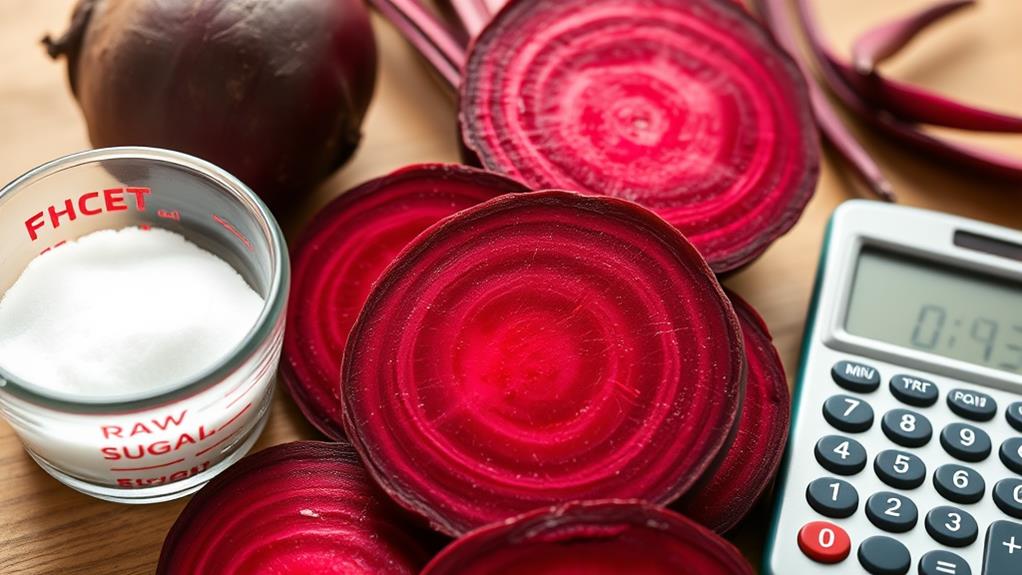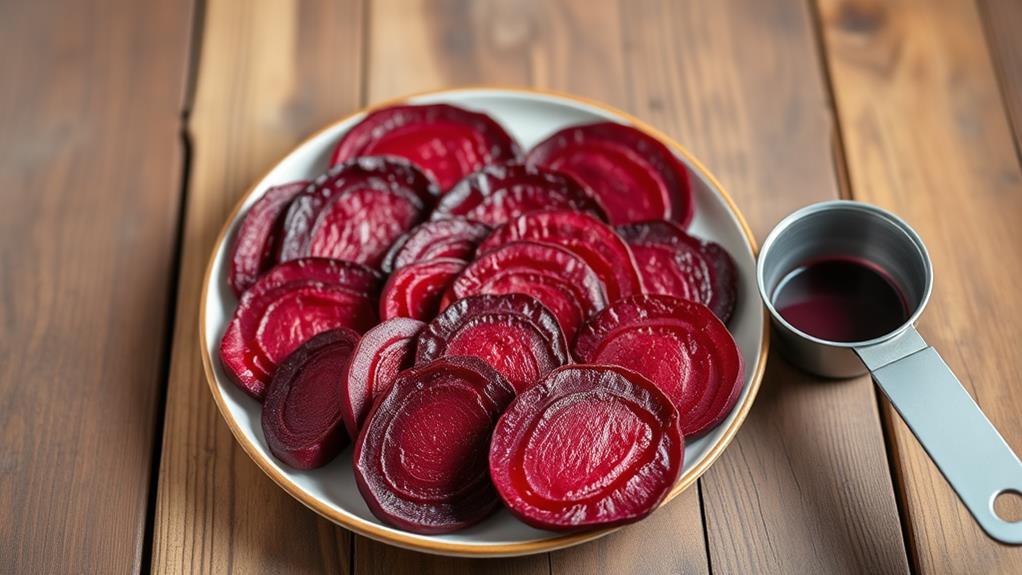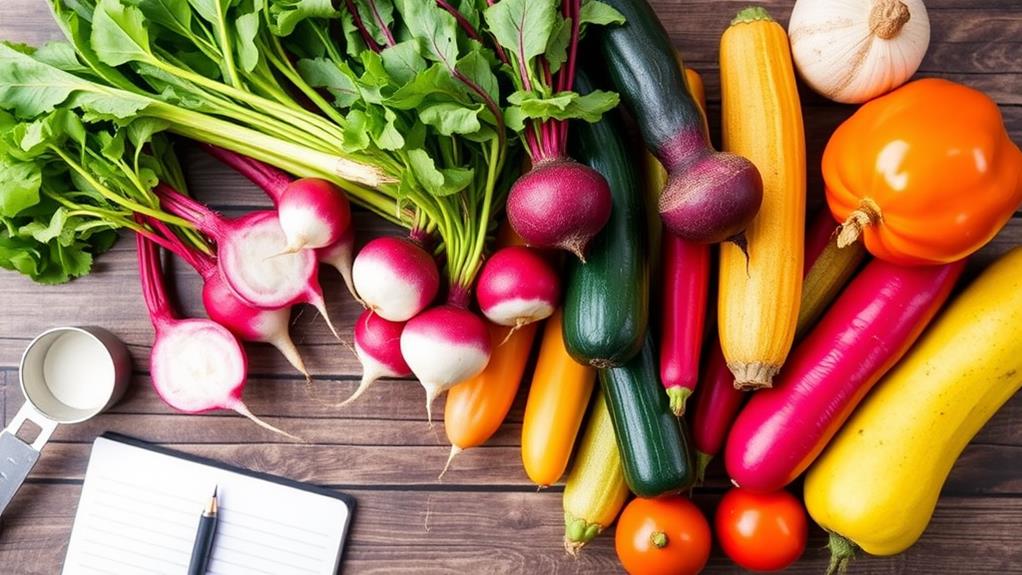If you're on a keto diet, you need to watch your carbohydrate intake closely, and beets can present a challenge. A medium beet contains about 13 grams of carbohydrates, with approximately 6.8 grams of net carbs per 100 grams. If you enjoy beets, consider limiting your serving to around half a cup, which adds roughly 4.6 grams of net carbs to your daily total. While they offer health benefits like antioxidants and folate, it's essential to monitor your overall carb consumption to maintain ketosis. Want to explore how to incorporate them wisely into your meals?
Beets and Keto Compatibility
When considering beets on a keto diet, you'll find they pose a unique challenge due to their higher carbohydrate content. With approximately 9.2 grams of net carbs per cup, beets aren't a keto-friendly option for those adhering to a strict keto lifestyle.
If you're following strict keto guidelines, you'll want to keep your daily carb counts low, and consuming beets could quickly eat into those limits. Instead, you might want to explore keto-friendly fruits such as avocados or berries that can provide essential nutrients without exceeding your carb limits.
While a 100g serving of beets contains about 6.76 grams of net carbs, it's vital to remember that moderation is key. Small portions might fit into a more lenient keto approach, but exceeding your daily carb allowance can disrupt ketosis, making it difficult to achieve your health goals.
For those committed to strict keto, alternative low-carb foods like radishes and zucchini often take precedence over beets. These substitutes can help you maintain your daily carb limits without sacrificing variety.
Ultimately, if you choose to include beets in your diet, do so sparingly and be mindful of how they affect your overall carbohydrate intake.
Nutritional Breakdown of Beets
When you look at the nutritional breakdown of beets, you'll find more than just carbs. Beets are often regarded as a higher-carb vegetable, but they also provide essential nutrients that can be beneficial in moderation on a keto diet.
Understanding the caloric content, fiber comparison, and the vitamins and minerals they offer can help you make informed choices on your keto journey.
Many low-carb fruits, such as strawberries, are excellent alternatives to evaluate for maintaining low carbohydrate intake while still enjoying a variety of flavors.
Let's break down these key factors to see how beets fit into your diet.
Caloric Content Overview
Beets often surprise people with their caloric and carbohydrate content, especially for a vegetable. One medium beet contains about 58 calories and around 13 grams of carbohydrates. While this makes them relatively low in calories, it's crucial to note that they're higher in carbs compared to many other vegetables. If you're following a keto diet, you'll want to keep an eye on these figures.
When considering raw beets, they provide approximately 43 calories and 9.6 grams of total carbs per 100-gram serving. After accounting for about 2.8 grams of fiber, the net carbs per serving drop to around 6.76 grams.
On the other hand, cooked beets contain roughly 10 more calories and maintain about 8 grams of net carbs per 100-gram serving. This highlights the significance of serving size when you're monitoring your carb intake.
Due to their high carbohydrate content, including beets on a keto diet can complicate your ability to maintain ketosis. You'll need to carefully track your daily carb intake to avoid exceeding your limits and guarantee you stay on track with your health goals.
Fiber and Carbohydrate Comparison
Understanding the nutritional breakdown of beets reveals important details about their fiber and carbohydrate content, especially for those on a keto diet. One medium beet has roughly 58 calories and contains about 13 grams of carbohydrates, with 9 grams being sugar.
While this might seem high, beets also provide around 2 grams of dietary fiber per serving, which is vital for digestion.
When calculating net carbs, it's important to subtract the fiber from the total carbohydrates. For beets, the net carb count is approximately 6.8 grams per 100 grams, which remains consistent even when cooked, showing about 8 grams of net carbs per 100 grams.
This means that if you're mindful of your portion size, you can still enjoy beets without blowing your carb limits.
However, be careful! Larger servings can turn these otherwise healthy roots into a high carb option that may not fit into your ketogenic diet.
Always consider the serving size to keep your net carbs in check while enjoying the unique flavor and nutritional benefits of beets.
Vitamins and Minerals Profile
Rich in vitamins and minerals, beets offer a variety of health benefits packed into a low-calorie package. With only 43-45 calories per 100g serving, they're a nutrient-dense choice for your diet.
Beets are particularly high in essential vitamins, providing about 20% of your daily value for folate, which supports heart health and reduces the risk of stroke.
You'll also find significant amounts of potassium, with around 325mg per 100g, helping to maintain proper bodily functions. This root vegetable contains 2.2g of dietary fiber, promoting digestion and gut health.
When considering beet's carb count, it's essential to recognize that they do contain net carbs, but their high fiber content can mitigate some of that impact.
Additionally, the antioxidants found in beets, particularly betalains, play a vital role in combating oxidative stress and inflammation in your body.
Incorporating beets into your keto diet can provide you with essential nutrients while keeping your meals vibrant and flavorful.
Carbohydrate Content Explained

When you're considering beets for your keto diet, it's essential to understand their carbohydrate content.
The ketogenic diet promotes increased fat burning, making it important to carefully monitor your carb intake. You need to look at both total and net carbs, as well as how portion sizes can impact your daily limits.
Total Carbs in Beets
Counting carbs can be tricky, especially with foods like beets. When you're on a keto diet, knowing the total carbs in beets is essential for maintaining your carb limits. Here's a quick breakdown of their carbohydrate content:
- One medium beet contains about 13 grams of total carbohydrates.
- A typical serving size, around ½ cup of raw beets, contributes roughly 4.6 grams of net carbs.
- One cup of raw beets has 9.2 grams of net carbs after accounting for 3.8 grams of dietary fiber.
- Beets have a net carb count of approximately 6.76 grams per 100 grams serving.
While beets offer numerous health benefits, they're considered high in carbs for strict keto dieters. As a result, you should consume them in moderation.
Portion control becomes important to avoid exceeding your daily carb limits. If you're following a less strict keto plan, you might be able to incorporate them, but always monitor your intake to stay within your goals.
Understanding the total carbs in beets will help you make informed choices on your journey to a healthier lifestyle.
Net Carbs Calculation
Understanding net carbs is essential for anyone on a keto diet, especially with foods like beets. When you look at the carbohydrate counts, beets have about 9.6 grams of total carbohydrates per 100 grams, but after considering fiber, the net carbs calculation reveals roughly 6.76 grams of net carbs.
One medium beet contains around 13 grams of carbohydrates, which translates to approximately 9.2 grams of net carbs per cup. This high carb content means you need to be mindful of your portions. A half-cup serving of cooked beets contributes about 4.6 grams of net carbs, making it important to practice portion control when including beets on keto.
With a daily net carb limit of 30 to 50 grams for a typical keto diet, tracking your intake is essential to avoid exceeding these limits. Since beets have a higher carbohydrate count compared to other vegetables, many people on strict keto diets often turn to keto-friendly alternatives like radishes or zucchini.
Being aware of the grams of net carbs in beets can help you make informed choices while following a keto diet.
Portion Control Strategies
To successfully incorporate beets into your keto diet, portion control is key. With their carbohydrate content, managing your beet consumption is essential for maintaining ketosis. Here are some strategies to help you:
- Limit Serving Size: Stick to small portions, ideally no more than ½ cup of cooked beets.
- Track Your Intake: Keep an eye on your daily net carb limit, which typically ranges from 30 to 50 grams on a keto diet.
- Calculate Net Carbs: Remember that ½ cup of beets contributes about 4.6 grams of net carbs, which can greatly affect your daily carb intake.
- Balance Your Meals: Pair beets with low-carb vegetables or protein to stay within your carbohydrate allowance.
Health Benefits of Beets
Why should you consider adding beets to your diet? The health benefits of beets are impressive, making them a valuable addition to your meals.
These vibrant root vegetables are rich in antioxidants, particularly betalains, which help combat oxidative stress and inflammation in your body. They also provide significant amounts of folate, delivering about 20% of your daily value per serving. This nutrient is essential for heart health and reducing the risk of stroke.
Additionally, incorporating beets into your diet can complement a low-carb, high-fat approach, aligning with the principles of the keto diet for those seeking heart health benefits potential heart health improvements.
One of the standout features of beets is their nitrate content. This naturally occurring compound may enhance blood flow and lower blood pressure, contributing to overall cardiovascular health.
If you're into fitness, incorporating beets can boost your athletic performance by increasing stamina and endurance through improved oxygen efficiency in your muscles.
Don't forget about digestive health; beets contain about 2 grams of dietary fiber per medium beet, promoting regularity.
While they're higher in carbs compared to some other veggies, their numerous health benefits make them a worthy choice.
Recommended Portion Sizes

Incorporating beets into your diet can be beneficial, but portion sizes are key, especially on a keto diet. Due to their relatively high carb content, you'll want to be mindful of how much you consume. Eating beets in moderation can help improve your overall insulin sensitivity while still enjoying their unique flavor.
Here are some recommended portion sizes to keep you on track:
- Cooked Beets: A typical serving size is about ½ cup, which contains around 4.6 grams of net carbs.
- Raw Beets: One cup of raw beets has approximately 9.2 grams of net carbs after accounting for fiber.
- Moderation is Key: Aim for portions between ¼ to ½ cup to maintain ketosis while enjoying beets.
- Daily Carb Tracking: If your daily limit is 30-50 grams of net carbs, even small servings of beets should fit carefully within your overall intake.
Keto-Friendly Beet Recipes
Beets can add a delightful twist to your keto meals without pushing your carb limits. By incorporating small amounts of keto-friendly beets, you can enhance the flavor and presentation of various dishes while staying within your carb limit.
The ketogenic diet promotes satiety and reduces hunger, making it easier to enjoy these flavorful vegetables in moderation, ultimately contributing to better blood sugar regulation and overall health.
For a fun dessert, try making a Keto Red Velvet Cake using pureed beets. This lower-carb alternative keeps the sweet flavor intact while adding moisture and vibrant color.
If you're looking for a rejuvenating salad, mix roasted or shredded beets into a Kale & Brussels Sprouts Salad. The beets provide natural sweetness without breaking your low-carb diet.
Another great option is a Cold Roast Vegetable Salad, where roasted beets combine with zucchini and bell peppers. This flavorful dish fits perfectly into your keto lifestyle when portioned correctly.
Don't forget about beet-infused keto hummus—blending roasted beets into your hummus not only enhances its color but also adds minimal net carbs, making it a nutritious dip.
Lastly, a Blueberry Spring Mix Salad can benefit from a small portion of beets, creating a unique taste while keeping the dish low in carbohydrates.
Enjoy these delicious Keto Recipes and savor eating beets in a keto-friendly way!
Alternatives to Beets

When you're looking for alternatives to beets, several delicious low-carb options can help maintain your keto lifestyle. Here are some great substitutes to evaluate:
- Radishes: With only 4 grams of total carbs per cup (2 grams net carbs), radishes are an excellent low-carb substitute for beets.
- Red Cabbage: This crunchy and colorful option offers 5 grams of total carbs per cup and just 3 grams net carbs, making it a suitable alternative.
- Tomatoes: While they bring a different flavor profile, tomatoes contain 4.8 grams of total carbs per cup and 3.3 grams net carbs, providing versatility in your dishes.
- Celery: At just 3 grams of total carbs per cup and 1.4 grams net carbs, celery works well in salads or cooked dishes.
If you're seeking a concentrated beet flavor without the bulk, beetroot powder is a viable option, offering about 2 grams of net carbs per teaspoon.
These alternatives not only keep your meals low-carb but also add variety to your keto diet while keeping the essence of beets in your dishes.
Tips for Incorporating Beets
To enjoy beets while keeping your keto diet on track, aim for a serving size of about ½ cup to keep net carbs around 4.6 grams. This helps you stay within your daily carb limits while still indulging in their earthy flavor.
When incorporating beets, consider using beetroot powder as a concentrated alternative; it offers health benefits with about 4 grams of carbs per scoop.
Pair cooked or raw beets with healthy fats like avocado or olive oil to enhance their flavor and maintain compliance with your ketogenic lifestyle. This combination not only makes dishes more satisfying but also helps stabilize your blood sugar levels.
Remember, moderation is key, so monitor how your body responds after consuming beets, as their natural sugars can impact glucose responses.
Explore creative ways to include beets in your meals. Try salads with kale and Brussels sprouts or whip up some keto-friendly hummus featuring beets.
These recipes allow you to enjoy their deliciousness without exceeding your carb limits, making it easier to stay on track with your keto diet while savoring the benefits of this vibrant vegetable.
Conclusion
Incorporating beets into your keto diet can feel like dancing on the edge of a culinary rainbow. While they do carry some carbs, their vibrant color and health benefits can brighten up your meals. By keeping portion sizes in check and exploring creative recipes, you can savor their earthy sweetness without straying too far from your keto goals. So, don't shy away—let beets add a splash of flavor and nutrition to your plate!







